中考英语反意疑问句总复习
- 格式:doc
- 大小:57.50 KB
- 文档页数:4
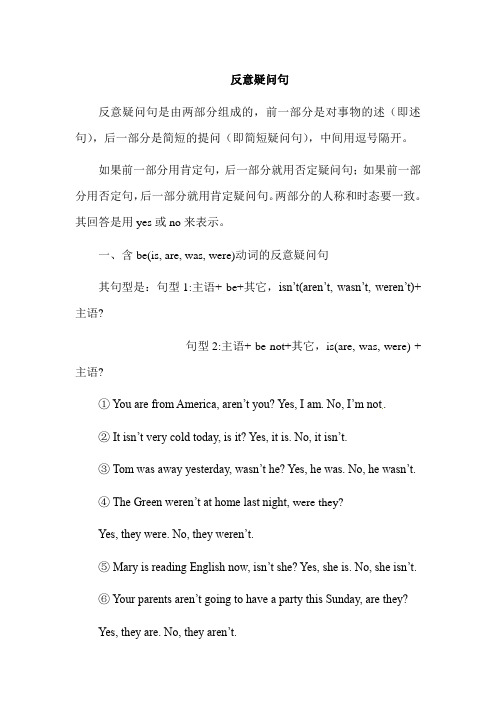
反意疑问句反意疑问句是由两部分组成的,前一部分是对事物的述(即述句),后一部分是简短的提问(即简短疑问句),中间用逗号隔开。
如果前一部分用肯定句,后一部分就用否定疑问句;如果前一部分用否定句,后一部分就用肯定疑问句。
两部分的人称和时态要一致。
其回答是用yes或no来表示。
一、含be(is, are, was, were)动词的反意疑问句其句型是:句型1:主语+ be+其它,isn’t(aren’t, wasn’t, weren’t)+ 主语?句型2:主语+ be not+其它,is(are, was, were) + 主语?① You are from America, aren’t you? Yes, I am. No, I’m not.② It isn’t very cold today, is it? Yes, it is. No, it isn’t.③ Tom was away yesterday, wasn’t he? Yes, he was. No, he wasn’t.④ The Green weren’t at home last night, were they?Yes, they were. No, they weren’t.⑤ Mary is reading English now, isn’t she? Yes, she is. No, she isn’t.⑥ Your parents aren’t going to have a party this Sunday, are they?Yes, they are. No, they aren’t.⑦ The girls were singing when the teacher came in, weren’t they?Yes, they were. No, they weren’t.注意:There be句型① There is an old picture on the wall, isn’t there?Yes, there is. No, there isn’t.② There aren’t any children in the room, are there?Yes, there are. No, there aren’t.③ There wasn’t a telephone call for me, was there?Yes, there was. No, there wasn’t.④ There were enough people to pick apples, weren’t there?Yes, there were. No there weren’t.二、行为动词的一般现在时的反意疑问句其句型是:句型1: 主语+动词原形+其它,don’t I(you, we, they)?句型2: 主语+ don’t+动词原形+其它,do I(you, we, they)?句型3: 主语+动词第三人称单数+其它,doesn’t he(she, it)?句型4: 主语+ doesn’t+动词原形+其它,doeshe(she, it)?① You often watch TV in the evening, don’t you? Yes, I do. No, I don’t.② The students don’t study hard, do they? Yes, they do. No, they don’t.③ Mary studies Chinese hard, doesn’t she? Yes, she does. No, she doesn’t.④ The boy doesn’t often go to school by bike, does he?Yes, he does. No, he doe sn’t.⑤The first class begins at eight, doesn’t it? Yes, it does. No, it doesn’t.三、行为动词的一般过去时的反意疑问句其句型是:句型1: 主语+动词过去式+其它,didn’t+主语?句型2: 主语+didn’t+动词原形+其它,did +主语?① You watched TV last night, didn’t you? Yes, I did. No, I didn’t.② Ji m’s parents didn’t go to Hong Kong last month, did they?Yes, they did. No, they didn’t.③ The rain stopped, didn’t it? Yes, it did. No, it didn’t.④Mr. Clarke didn’t buy a car, didn’t he? Yes, he did. No, he didn’t.四、一般将来时的反意疑问句其句型是:句型1: 主语+will+动词原形+其它,won’t+主语?句型2: 主语+ won’t +动词原形+其它,will +主语?①The boys will play games, won’t they? Yes, they will. No, they won’t.② It won’t stop raining, will it? Yes, it will. No, it won’t.③ Mr. Smith will visit our school next week, won’t he? Yes, he will. No, he won’t.注意:There be句型的一般将来时① There will be a basketball match tomorrow, won’t there?Yes, there will. No, there won’t.② There won’t be too much pollution in the future, will there?Yes, there will. No, there won’t.五、现在完成时的反意疑问句其句型是:句型1: 主语+have+动词过去分词+其它,haven’t+主语?句型2: 主语+ haven’t +动词过去分词+其它,have +主语?句型3: 主语+has+动词过去分词+其它,hasn’t+主语?句型4: 主语+ hasn’t +动词过去分词+其它,has +主语?① You have been to Shanghai before, h aven’t you? Yes I have. No, I haven’t.② You haven’t been to Shanghai before, have you? Yes I have. No, I haven’t.③Jack has done his homework, hasn’t he? Yes, he has. No, he hasn’t.④Jack hasn’t done his homework, has he? Yes, he has. No, he hasn’t.六、现在完成进行时的反意疑问句其句型是:句型1: 主语+have been+动词现在分词+其它,haven’t+主语?句型2: 主语+ haven’t been +动词现在分词+其它,have +主语?句型3: 主语+has been +动词现在分词+其它,hasn’t+主语?句型4: 主语+ hasn’t been +动词现在分词+其它,has +主语?① You have been skating for five hours, h aven’t you? Yes, I have. No, I haven’t.② You haven’t been skating for five hours, have you? Yes, I have. No, I haven’t.③ Bob has been collecting kites since 1999, hasn’t he? Yes, he has. No, he hasn’t.④ Bob hasn’t been collecting kites since 1999, has h e? Yes, he has. No, he hasn’t.七、含有情态动词的反意疑问句其句型是:句型1: 主语+情态动词+动词原形+其它,情态动词否定形式+主语?句型2: 主语+情态动词否定形式+动词原形+其它,情态动词+主语?① You can speak French, can’t you? Yes, I can. No, I can’t.②They can’t understand me, can they? Yes, they can. No, they can’t.③ Ann could swim when she was six, couldn’t she? Yes, she could. No, she couldn’t.④ The students must study hard, mustn’t they? Yes, they must. No, they needn’t.注意:You must go home now, needn’t you? Yes, I must. No, I needn’t.★值得注意的是有时英语的谓语动词并不用否定式(即没加上not),而是用上了“never, little, few, hardly, nothing, nobody”等词,这时该述句也属于否定句,因此,反意疑问句的后半部分应用肯定疑问式。
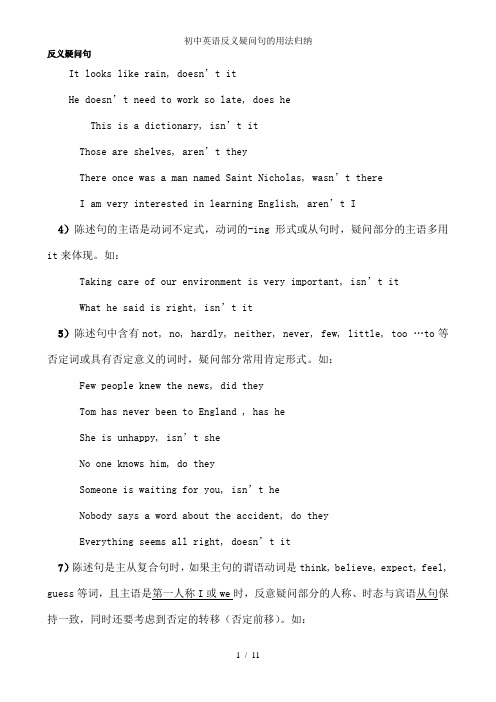
反义疑问句It looks like rain, doesn’t itHe doesn’t need to work so late, does heThis is a dictionary, isn’t itThose are shelves, aren’t theyThere once was a man named Saint Nicholas, wasn’t thereI am very interested in learning English, aren’t I4)陈述句的主语是动词不定式,动词的-ing形式或从句时,疑问部分的主语多用it来体现。
如:Taking care of our environment is very important, isn’t itWhat he said is right, isn’t it5)陈述句中含有not, no, hardly, neither, never, few, little, too …to等否定词或具有否定意义的词时,疑问部分常用肯定形式。
如:Few people knew the news, did theyTom has never been to England , has heShe is unhappy, isn’t sheNo one knows him, do theySomeone is waiting for you, isn’t heNobody says a word about the accident, do theyEverything seems all right, doesn’t it7)陈述句是主从复合句时,如果主句的谓语动词是think, believe, expect, feel, guess等词,且主语是第一人称I或we时,反意疑问部分的人称、时态与宾语从句保持一致,同时还要考虑到否定的转移(否定前移)。

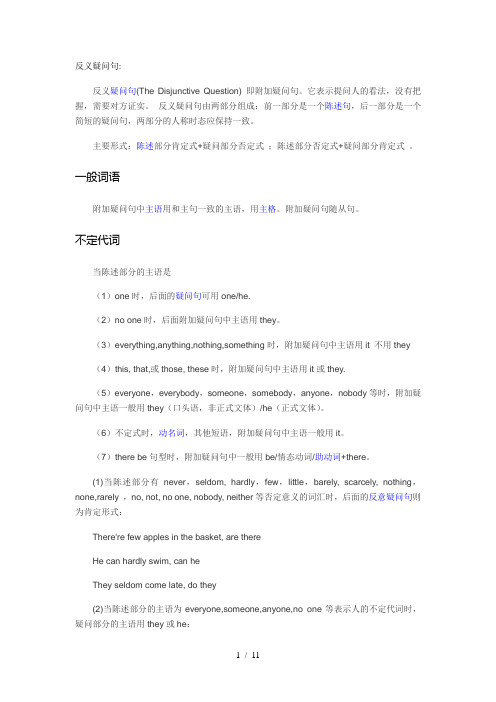
反义疑问句:反义疑问句(The Disjunctive Question) 即附加疑问句。
它表示提问人的看法,没有把握,需要对方证实。
反义疑问句由两部分组成:前一部分是一个陈述句,后一部分是一个简短的疑问句,两部分的人称时态应保持一致。
主要形式:陈述部分肯定式+疑问部分否定式;陈述部分否定式+疑问部分肯定式。
一般词语附加疑问句中主语用和主句一致的主语,用主格。
附加疑问句随从句。
不定代词当陈述部分的主语是(1)one时,后面的疑问句可用one/he.(2)no one时,后面附加疑问句中主语用they。
(3)everything,anything,nothing,something时,附加疑问句中主语用it 不用they(4)this, that,或those, these时,附加疑问句中主语用it或they.(5)everyone,everybody,someone,somebody,anyone,nobody等时,附加疑问句中主语一般用they(口头语,非正式文体)/he(正式文体)。
(6)不定式时,动名词,其他短语,附加疑问句中主语一般用it。
(7)there be句型时,附加疑问句中一般用be/情态动词/助动词+there。
(1)当陈述部分有never,seldom, hardly,few,little,barely, scarcely, nothing,none,rarely ,no, not, no one, nobody, neither等否定意义的词汇时,后面的反意疑问句则为肯定形式:There're few apples in the basket, are thereHe can hardly swim, can heThey seldom come late, do they(2)当陈述部分的主语为everyone,someone,anyone,no one等表示人的不定代词时,疑问部分的主语用they或he:Everyone in your family is a teacher, aren’t they\isn't he?(3)当陈述部分的主语为everything,something,anything.nothing等表示物的不定代词时,疑问部分的主语用it:Something is wrong with your watch, isn’t it(4)当陈述部分含有否定意思的词是unhappy,dislike,unfriendly,等含有否定词缀的派生词,也就是有un,dis,no-前缀、-less后缀等含有词缀而意思否定的词,当做肯定句处理,疑问部分要用否定形式。

即附加疑问句。
它表示提问人的看法,没有把握,需要对方证实。
它表示提问人的看法,没有把握,需要对方证实。
反义疑问句由两部分组成:前一部分是一个陈述句,后一部分是一个简短的疑问句,两部分的人称时态应保持一致。
1.陈述部分肯定式+疑问部分否定式2.陈述部分否定式+疑问部分肯定式They work hare, don’t they?She was ill yesterday, wasn’t she?You didn’t go, did you?He can’t ride a b ike, can he?请注意以下句型的反义疑问句的用法:1.当陈述部分的主语是I , everyone, everything, nobody 时,后面的疑问句应表示为:I am a student, aren’t IEveryone is in the classroom, aren’t they?Everything begins to grow in spring, doesn’t it?Nobody will go, will they?2. 当陈述部分有never,seldom, hardly,few,little,barely, scarcely, nothing 等否定词时,后面的疑问句则表示为:There are few apples in the basket, are there?He can hardly swim, can he?They seldom come late, do they?3. 当陈述部分是I think 加从句时,疑问句应和从句的人称时态保持一致。
I think chickens can swim, can’t th ey?I think Lucy is a good girl, isn’t she?I didn't think he was happy, was he?4. 陈述部分有had better 时,疑问句应用hadn’t开头:you’d better get up early, hadn’t you?5.当陈述部分是祈使句时,疑问句要根据语气来表达Let’s go out for a walk, shall we?Let us go our for a walk, will you?Turn on the radio, will you?6.反义疑问句的回答用yes,no,但是,当陈述部分是否定形式时,回答要按事实。

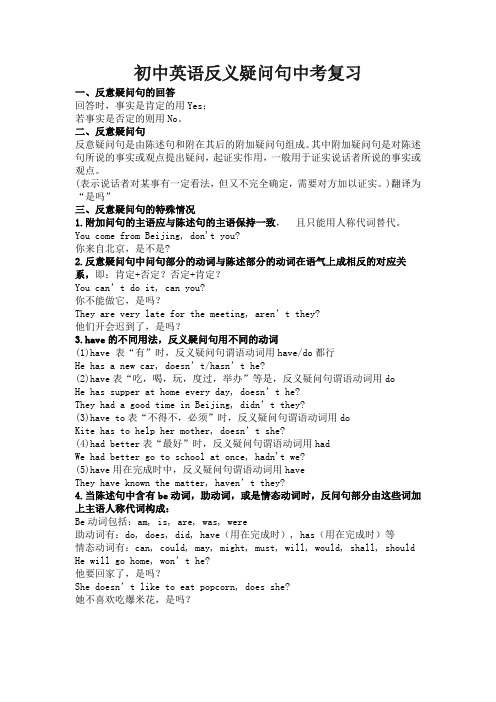
初中英语反义疑问句中考复习一、反意疑问句的回答回答时,事实是肯定的用Yes;若事实是否定的则用No。
二、反意疑问句反意疑问句是由陈述句和附在其后的附加疑问句组成。
其中附加疑问句是对陈述句所说的事实或观点提出疑问,起证实作用,一般用于证实说话者所说的事实或观点。
(表示说话者对某事有一定看法,但又不完全确定,需要对方加以证实。
)翻译为“是吗”三、反意疑问句的特殊情况1.附加问句的主语应与陈述句的主语保持一致,且只能用人称代词替代。
You come from Beijing, don't you?你来自北京,是不是?2.反意疑问句中问句部分的动词与陈述部分的动词在语气上成相反的对应关系,即:肯定+否定?否定+肯定?You can’t do it, can you?你不能做它,是吗?They are very late for the meeting, aren’t they?他们开会迟到了,是吗?3.have的不同用法,反义疑问句用不同的动词(1)have 表“有”时,反义疑问句谓语动词用have/do都行He has a new car, doesn’t/hasn’t he?(2)have表“吃,喝,玩,度过,举办”等是,反义疑问句谓语动词用doHe has supper at home every day, doesn’t he?They had a good time in Beijing, didn’t they?(3)have to表“不得不,必须”时,反义疑问句谓语动词用doKite has to help her mother, doesn’t she?(4)had better表“最好”时,反义疑问句谓语动词用hadWe had better go to school at once, hadn't we?(5)have用在完成时中,反义疑问句谓语动词用haveThey have known the matter, haven’t they?4.当陈述句中含有be动词,助动词,或是情态动词时,反问句部分由这些词加上主语人称代词构成:Be动词包括:am, is, are, was, were助动词有:do, does, did, have(用在完成时), has(用在完成时)等情态动词有:can, could, may, might, must, will, would, shall, should He will go home, won’t he?他要回家了,是吗?She doesn’t like to eat popcorn, does she?她不喜欢吃爆米花,是吗?5.(1)当陈述部分所含的否定词是通过加前缀或后缀构成的,(也就是有un, dis-前缀、less-后缀等含有词缀而意思否定的词),当做肯定句处理,其后的反意疑问句依然用否定结构。

反义疑问句知识点详解(初中英语专项复习)一、定义反意疑问句又名附加疑问句。
属疑问句的一种,表示说话者对某事有一定看法,但又不完全确定,需要对方加以证实。
二、结构和原则:1.反意疑问句一般分为两个部分:前一个部分陈述句,后一部分为缩略形式的句问。
如:There is a tree in front of the building, isn’t there?2.反意疑问句遵守前肯后否, 前否后肯, 时态一致性的原则.三、用法:一.反意疑问句主语及谓语的确定.1.陈述部分含有never, few ,little,hardly,seldom,rarely(罕见), no,nothing, nobody, none, too…to 等表示否定意义的词时,其附加问句就用肯定形式.There are few people in the room, are there?She is too young to go to school, is she?2.陈述句部分是“There be…”结构时,疑问部分用“be there”.There is a tree in front of the building, isn’t there?There will not be any trouble, will there?3.陈述部分主语为this, that 等时,附加部分主语应用it.类似地,陈述部分主语为these, those等时,附加部分主语应用they.This is a beautiful picture, isn’t it?Those aren’t apple trees, are they?4.当陈述句部分动词为have(has)时有下列几种情况:(1)have在一般现在时中表示“有”之意,附加问句部分谓语可用“have”或用助动词do.Tom has a new watch, doesn’t he( hasn’t he)?(2) have to表示“不得不”“必须”之意时,附加问句部分谓语应用助动词do.Kate has to help her mother at home, doesn’t she?(3) have 表示“吃、喝、玩、度过”等意时,其附加问句的谓语应用助动词do.They have a good time in Beijing, don’t they?(4)have 在完成时中,其附加问句谓语动词应用have.Lucy has ever been to Japan, hasn’t she?(5) had better 最好,在祈使句中,其附加问句谓语动词应用hadYou had better clean the room,hadn’t you?5.肯定的祈使句的附加问句可用will you或won’t you,否定的祈使句的附加问句用will you.Listen to me carefully, will you?Don’t play with fire, will you?6.以let’s开头的祈使句,附加问句用shall we;而以let us 开头的祈使句,附加问句用will you.Let’s go to the park, shall we?Let us help you, will you?7.think, believe, expect, imagine, suppose等引导的宾语从句:A.主语是第一人称(应特别注意否定的转移)I don’t think he is bright, is he?We believe she can do it better, can’t she?B. 如果主语不是第一人称则疑问部分与主句相对应构成反意疑问句He thought they were wrong, didn’t he?8.否定前缀或后缀(否定前缀dis-, un-, im-或否定后缀-less,如dislike, discourage, unfair, unable等)不能视为否定词,其反意疑问句仍用否定形式。

英语“反义疑问句”专项复习一、反义疑问句的基本结构与形式反义疑问句(The Disjunctive Question) 即附加疑问句,是英语四大问句之一。
它表示提问人的看法,没有把握,需要对方证实。
句尾升调表示疑问,降调表示反问。
结构:1. 陈述部分肯定句+疑问部分否定句(可记为前肯后否)。
2. 陈述部分否定句+疑问部分肯定句(可记为前否后肯)。
如:①She often has lunch at school, doesn’t she? ①You don’t like sports, do you?二、反意疑问句通常对应规则一)、肯定+否定?否定+肯定?也就是前肯后否,前否后肯的原则。
如:①You can’t do it, can you? ①They are very late for the meeting, aren’t they?二)、反意疑问句中问句部分的动词与陈述部分的动词种类要对应一致。
如:①He has supper at home every day, doesn’t he? (不能用hasn’t he?)①They have known the matter, haven’t they? (不能用don’t they?)三)、反意疑问句中问句部分的动词在时态上应和陈述部分的时态一致。
如:①They will go to town soon, won’t they?(不能用don’t they?或aren’t they?)①He works very hard, doesn’t he?(不能用didn’t he?或won’t he?)三、反义疑问句的特殊用法1.祈使句后加一个反意疑问句,更加委婉。
肯定祈使句、否定祈使句后的反意疑问句通常只用will you。
但Let’s之后用shall we?。
除Let’s用shall we,其他都用will you。
2.陈述部分的主语是I’m,疑问部分要用aren’t I ? 如:I’m a student, aren’t I?3.陈述部分的主语是wish,疑问部分要用may I? 如:I wish to have a word with you, may I?4.陈述句部分主语是everything, something, anything, nothing时,其后的反意疑问句主语用it。



初中英语反义疑问句归纳总结大全初中英语中的反义疑问句是通过将原句中的陈述句部分变为负形式并加上疑问词形式来构成的。
下面是一些常用的初中英语反义疑问句:1. There is nobody here, is there?这里没人,对吗?2. You don't have any money, do you?你没有钱,对吗?3. He hasn't finished his homework yet, has he?他还没完成作业,对吗?4. She can't speak French, can she?她不会说法语,对吗?5. We shouldn't eat junk food, should we?我们不应该吃垃圾食品,对吗?他们不会来参加聚会,对吗?7. It isn't raining, is it?不下雨,对吗?8. You haven't seen this movie, have you?你没看过这部电影,对吗?9. He didn't pass the exam, did he?他考试没通过,对吗?10. She doesn't like swimming, does she?她不喜欢游泳,对吗?11. You won't forget to buy milk, will you?你不会忘记买牛奶,对吗?12. They aren't going on vacation, are they?他们不打算度假,对吗?请注意,反义疑问句的肯定形式和否定形式取决于原句的陈述部分。
如果原句是肯定的,反义疑问句则使用否定形式;如果原句是否定的,反义疑问句则使用肯定形式。
如果原句中含有实义动词(如have, do, can, will等),则需要使用助动词进行倒装。

中考英语:反意疑问句中考英语语法复习:反意疑问句在陈述句之后加上一个意思与之相反的简短问句,这种句子叫做反意疑问句。
反意疑问句必须由意思相反的两部分组成,在前一部分(陈述句)之后用逗号,后一部分(简短问句)之后用问号。
反意疑问句的否定句必须用缩略形成,同时它的主语必须用人称代词,不能用名词。
前一部分用降调,后一部分在表示疑问时用升调,在表示强调某意思时用降调。
反意疑问句分为两类:1.前一部分为肯定式,后一部分是否定式。
2.前一部分为否定式,后一部分是肯定式。
一、陈述句(肯定式),+疑问部分(否定式)?1.be 动词和一般动词(实义动词)构成的反意疑问句be 动词句型:现在→?,isn’t (aren’t )+主语?过去→?,wasn’t (weren’t )+主语?一般动词句型:现在→?,don’t (doesn’t )+主语?过去→?,didn’t +主语?The pen is yours ,isn’t it ?这笔是你的,不是吗? Lucy likes English ,doesn’t she ?路希喜欢英语,不是吗?Yes ,she does.是的,她喜欢。
No ,she doesn’t.不,她不喜欢。
That was a wonderful night ,wasn’t it ?那是个奇妙的夜晚,不是吗?Yes ,it was.是的,它是。
No ,it wasn’t.不,它不是。
Your sister helped him ,didn’t she ?你姐姐帮助了他,不是吗?Yes ,she did.是的。
她帮助他。
No ,she didn’t.不。
她没有帮助他。
注意反意疑问句中,前后两部分的动词在人称、数和时态上通常保持一致。
另外后一部分的人称代词应和前一部分的主语(名词或代词)保持一致。
Tom is skating ,isn’t he ?(进行时)汤姆在滑冰,不是吗?Yes ,he is.是的。
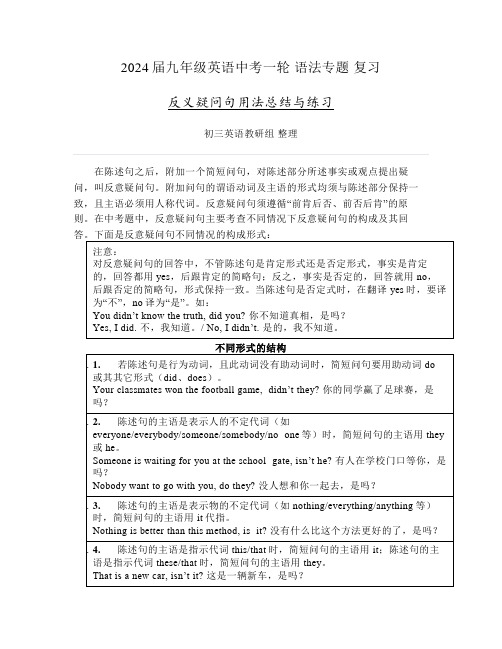
2024届九年级英语中考一轮语法专题复习反义疑问句用法总结与练习初三英语教研组整理在陈述句之后,附加一个简短问句,对陈述部分所述事实或观点提出疑问,叫反意疑问句。
附加问句的谓语动词及主语的形式均须与陈述部分保持一致,且主语必须用人称代词。
反意疑问句须遵循“前肯后否、前否后肯”的原则。
在中考题中,反意疑问句主要考查不同情况下反意疑问句的构成及其回专项练习:1. Tell me how to solve this problem, ____?A. do youB.don't youC. will youD.shan't you2. Half an hour ought to be enough time, ____?A. shouldn't itB. didn't theyC. oughtn't half an hourD. shouldn't half an hour3. They have to go to school now, ____?A. haven't theyB. don't theyC. hadn't theyD. did they4. When the car crashed, your brother escaped being hurt, ____?A. did itB.didn't itC. didn't heD. did he5. I'm dirty, ____?A. am IB.isn't IC. aren't ID.am not I6. That's the sort of the book you want,____?A. is thatB.isn't itC. is itD.isn't that7. I suppose you're not leaving, ____?A. are youB.don't youC. do youD.aren't you8. I wish to shake hands with you, ____?A shall I B.may IC. do ID.will I9. AIl these dictionaries are a great help to you, ____?A. aren't all theseB. are all these dictionariesC. aren't theyD. are they dictionaries10. The film that we saw last week was quite amazing, ____?A. was itB. wasn't itC. weren't weD. didn't we11. He has been writing letters all afternoon, but he should have finished them by now, ____?A. shouldn't heB. didn't youC. hasn't heD. has he12. We'd rather stay at home tonight, ____?A. isn't itB.hadn't weC. wouldn't weD. won't we13. There appeared to be no better way,____?A. didn't thereB. were thereC. did thereD. wasthere14. You had some trouble finding where Ilive, ____?A. do IB. hadn't youC. didn't youD. don't I15. He has his hair cut every month, ____?A. has heB.hasn't heC. does heD.doesn't he16. Jim told me that he would take a tripto Britain, ____?A. would heB.wouldn't heC. did heD.didn't he17. Jimmy dare not go to church, ____?A. does heB.dare heC. daren't heD. doesn't he18. She would have worked abroad if she'd had the chance, ____?A. wouldn't sheB. would sheC. hadn't sheD. has she19. Everyone is enjoying themselves, ____?A. aren't theyB. isn't everyoneC. does heD.is he20. Anyone can have a meal here, ____?A. can theyB. can't anyoneC. can't theyD. can anyone21. Your friend needs to e earlier,____?A. need heB.needn't heC. does heD.doesn't he22. Jenny scarcely es to visit you, ____?A. does sheB.doesn't sheC. do youD.don't you23. Let's listen to the radio program that the teacher mentioned, ____?A. don't weB.do weC. shall weD.shan't we24. The teacher had a talk with you, ____?C. did sheD.didn't she25. You think you're funny, ____?A. do youB. are youC. don't youD. didn't you26. Janet used to take part in labor in that village, ____?A. used sheB.did sheC. didn't sheD. should she27. What a beautiful flower, ____?A. doesn't itB. isn't itC. won't itD. is it28. No one will believe how difficult his work has been, ____?A. will heB.won't nobodyC. will theyD. won't they29. You must have made the mistake, ____?A. mustn't youB. haven't youC. didn't youD. hadn't you30. Learning how to repair puters takes a long time, ____?A. isn't itB. aren't theyC. doesn't itD. don't they31. Tom has milk with breakfast, ____?A. hasn't TomB. hasn't heC. doesn't TomD. doesn't he32. They must have stayed at hotel last night, ____?A. mustn't theyB. haven't theyC. didn't theyD. hadn't they33. Something'll have to be done about the air pollution, ____?A. won't itB.will itC. has itD.does it34. You must be hungry, ____?A. must youB.mustn't youC. are youD.aren't you35. She had the clothes cleaned, ____?C. didn't sheD. didn't her daughter36. There isn't anything wrong with the car, ____?A. is thereB.is itC. does itD.does there答案:15 CABCC610 BABCB1115 ACCBD1620 DBAAC2125 DACDC2630 CBABC3136 DCADCA。
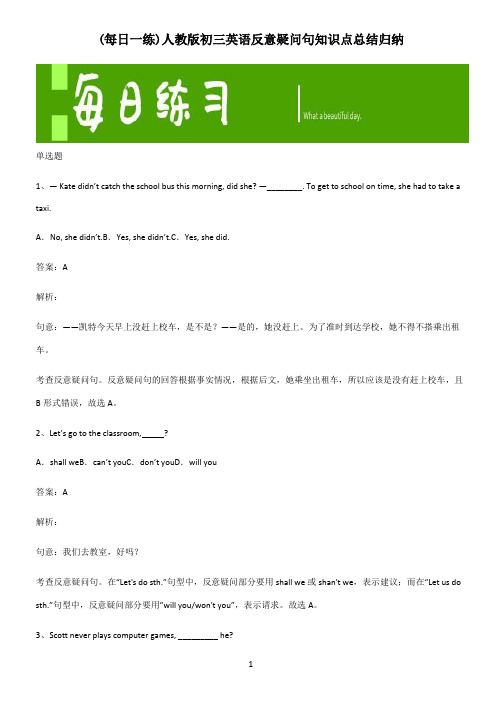
(每日一练)人教版初三英语反意疑问句知识点总结归纳单选题1、—Kate didn’t catch the school bus this morning, did she? —________. To get to school on time, she had to take a taxi.A.No, she didn’t.B.Yes, she didn’t.C.Yes, she did.答案:A解析:句意:——凯特今天早上没赶上校车,是不是?——是的,她没赶上。
为了准时到达学校,她不得不搭乘出租车。
考查反意疑问句。
反意疑问句的回答根据事实情况,根据后文,她乘坐出租车,所以应该是没有赶上校车,且B形式错误,故选A。
2、Let’s go to t he classroom,?A.shall weB.can’t youC.don’t youD.will you答案:A解析:句意:我们去教室,好吗?考查反意疑问句。
在“Let's do sth.”句型中,反意疑问部分要用shall we或shan't we,表示建议;而在“Let us do sth.”句型中,反意疑问部分要用”will you/won't you”,表示请求。
故选A。
3、Scott never plays computer games, _________ he?A.doesB.doesn’tC.isD.isn’t答案:A解析:句意:Scott从不玩电脑游戏,是吗?考查反意疑问句。
句子为反意疑问句,遵循“前肯后否,前否后肯”,陈述句中含never,附加部分用肯定形式,排除BD;根据“plays”可知疑问部分用助动词does。
故选A。
4、—Mike saved many boys in the earthquake, didn’t he?—________ He is a hero in our school now!A.Yes, he didB.Yes, he hasC.No, he didn’tD.No, he hasn’t答案:A解析:句意:——迈克在地震中救了许多男孩,是吗?——是的,他做到了。
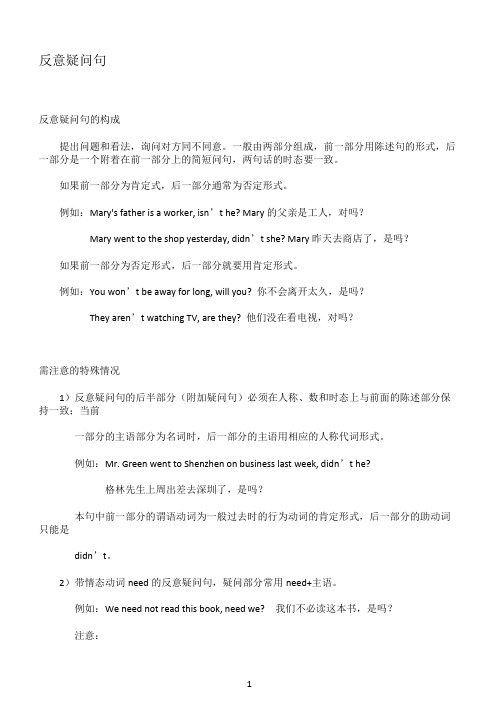
反意疑问句反意疑问句的构成提出问题和看法,询问对方同不同意。
一般由两部分组成,前一部分用陈述句的形式,后一部分是一个附着在前一部分上的简短问句,两句话的时态要一致。
如果前一部分为肯定式,后一部分通常为否定形式。
例如:Mary's father is a worker, isn’t he? Mary的父亲是工人,对吗?Mary went to the shop yesterday, didn’t she? Mary昨天去商店了,是吗?如果前一部分为否定形式,后一部分就要用肯定形式。
例如:You won’t be away for long, will you? 你不会离开太久,是吗?They aren’t watching TV, are they? 他们没在看电视,对吗?需注意的特殊情况1)反意疑问句的后半部分(附加疑问句)必须在人称、数和时态上与前面的陈述部分保持一致;当前一部分的主语部分为名词时,后一部分的主语用相应的人称代词形式。
例如:Mr. Green went to Shenzhen on business last week, didn’t he?格林先生上周出差去深圳了,是吗?本句中前一部分的谓语动词为一般过去时的行为动词的肯定形式,后一部分的助动词只能是didn’t。
2)带情态动词need的反意疑问句,疑问部分常用need+主语。
例如:We need not read this book, need we?我们不必读这本书,是吗?注意:need既可作情态动词,又可作行为动词。
作行为动词,变反意疑问句时,附加疑问句中只能选用适当的助动词。
例如:The poor man needs our help, doesn’t he?3)have当“有”讲进行反意疑问时,可以添加助动词,也可以不加助动词。
例如:He has few friends in the new school, does / has he?他在新学校里没有什么朋友,是吗?4)省去主语的祈使句的反意疑问句,疑问部分用will you。
反意疑问句精讲及训练(2012.05.16)一、反意疑问句的意义及其构成反意疑问句又叫附加疑问句,是指当提问的人对前面所叙述的事实不敢肯定,而需要向对方加以证实时所提出的问句。
其结构为:前一部分是一个陈述句,后一部分是一个简单的问句。
完成后一部分简单问句时,要根据前面陈述句的动词时态和人称来选择适当的助动词进行提问,前后两部分的人称和动词时态要保持一致。
“前肯后否,前否后肯”。
He is a good boy , isn’t he ? 他是一个好男孩,是吗?陈述句(肯定)简单问句(否定)She wasn’t at home yesterday, was she? 她昨天不在家,是吗?陈述句(否定)简单问句(肯定)They work hard , don’t they? 他们工作很努力,是吗?二、简单句式结构中反意疑问句的运用反意疑问句运用于简单句式结构中时,我们应注意掌握以下几个方面1、当陈述句部分的主语是名词时,反意疑问句的主语必须用人称代词来代替。
例Your brother goes to the library, do esn’t he? 你弟弟去图书馆了,是吗?Lily and Lucy are twin sisters, aren’t they ?莉莉和露西是双胞胎姐妹,是吗?2、当陈述句的主语是指示代词this, that时,反意疑问句的主语用it代替;指示代词是these, those时,反意疑问句的主语用they代替。
例That isn’t a useful book, is it? 那不是一本有用的书,是吗?These are some good students , aren’t they? 这些都是好学生,是吗?陈述部分的主语为不定式、动名词、或从句时,疑问部分的主语用it .Reading in bed is bad for your eyes, isn’t it?3、当陈述句部分是I am…时,反意疑问句部分通常要用aren’t I;如陈述句部分的主语是I am not时,反意疑问句部分通常要用am I。
例I’m late for the meeting, aren’t I? 我开会迟到了,是吗?I’m not doing well, am I? 我干得不好,是吗?4、陈述部分是everyone / everybody, someone / somebody, no one / nobody, none等表示人的不定代词时,反意疑问句部分的主语多用they,但也可用he;当陈述部分的主语是everything, anything, something, nothing等表示物的不定代词时,反意疑问句的主语用it。
例Nobody came when I was out, did they? 我在外时,没人来过,是吗?Everything has gone wr ong today, hasn’t it? 今天什么都出问题了,是不是?Everyone is in the classroom, aren’t they?大家都在教室里,是吗?5.当陈述部分是“there be + 主语+ 其它”结构时,反意疑问部分主语用there。
There is something wrong with the computer, isn't there? 这台电脑有点毛病,是吗?There aren't any fish in the river, are there? 这条河里没有鱼, 是吗?6.祈使句反意疑问句的构成,必须按其句子结构及讲话人的语气来决定其反意部分,有5种形式。
(1)祈使句,通常用will you;表示“邀请、劝说”时,用won’t you。
Close the door, will you ?请关门,好吗?(表请求)Don’t smoke in the meeting room, will you? 请不要在会议室抽烟,好吗?Come to have dinner with us this evening, won’t you? 今晚跟我们去吃饭,好吗?(表邀请)(2)以let us 开头的祈使句用will you. Let us go our for a walk, will you?(3)以let’s 开头的祈使句用shall we. Let’s go out for a walk, shall we?7. 陈述部分有had better 时,疑问句应用hadn’t开头:Y ou’d better get up early, hadn’t you? 你最好早点起床,对吗?8.在宾语从句中,如果陈述句部分是“I think (believe, suppose, expect等)+ 宾语从句”,反意疑问句部分应与宾语从句的主谓保持一致,并要注意否定转移。
例I think Lucy is a good girl, isn’t she? 我认为Lucy是一个好女孩,是吗?I didn't think he was happy, was he? 我想他不高兴,是吗?注当某人认为think等这些动词的主语不是第一人称,或主语是第一人称,而动词时态不是一般现在时或一般过去时,这时,反意疑问句的助动词和人称代词要与主句保持一致。
例Mary thinks you will come to the party, doesn’t she? 玛丽认为你将来参加晚会,是吗?9、当陈述部分有hardly, seldom, few, little, no, never, nothing, nobody, scarcely(几乎不), barely(仅仅), rarely(很少),nowhere(无处)等否定词或半否定词时,反意疑问句部分要用肯定形式。
―即前否后肯例如:The old man can hardly read, can he? 这位老人不识字,对吗?Little food has been left, has it? 吃的东西几乎没剩下,是吗?He has few good friends, has he? 他几乎没有要好的朋友,是不是?注如果陈述句部分是带有否定前缀或后缀时,反意疑问句部分仍用否定结构。
例如:The students were impolite(否定前缀), weren't they? 那些学生没有礼貌,不是吗?It’s impossible for him to make such a mistake, isn’t it? 他不可能犯这样的错误,是吗?10、反意疑问句的回答对反意疑问句的回答,无论问题的提法如何,如果事实是肯定的,就用yes,事实是否定的,就要用no。
要特别注意陈述句部分是否定结构,反意疑问句部分用肯定式提问时,回答yes或no与汉语正好相反。
这种省略回答的yes要译成“不”,no要译成“是”。
例---He likes playing football, doesn’t he? 他喜欢踢足球,是吗?---Ye s, he does. / No, he doesn’t. 是的。
/ 不是。
---His sister didn’t go to school , did she? 他妹妹没有上学,是吗?---Yes, she did. / No, she didn’t. 不,她上了。
/ 是的,她没上。
(记住翻译的不同)以下反意疑问句的例子只作了解:1、当陈述部分的谓语动词是have时,有两种情况。
(1)have作“有”解时,反意疑问句部分可用have(not)或do(not)的相应形式。
例His brother has a new bike, hasn’t (doesn’t) he? 他弟弟有一辆新自行车,是吗?(2)have用作实义动词时,反意疑问句部分只可用do(not)的相应形式。
例We have to start early, don’t we? 我们必须早点出发,是吗?2、当陈述句部分有情态动词must时,反意疑问部分有四种情况(1)must表示“必须、禁止“时,反意疑问部分要用must (mustn’t) 。
例You mustn’t stop your car here, must you? 你不能把车停在这地方,知道吗?(2)must表示“有必要”时,反意疑问句部分要用needn’t。
例They must finish the work today, needn’t they? 他们今天必须要完成这项工作,是吗?(3)当must用来表示对现在的情况进行“推测”时,反意疑问部分要根据must后面的动词采用相应的形式。
例He must be good at maths, isn’t he? 他数学一定学得很好,是吗?She must be a good girl, isn’t she ? 她一定是个还女孩,是吗?3、当陈述部分的谓语动词是表示愿望的wish时,反意疑问部分要用may,而且前后两个部分均用肯定式。
例I wish to go to the moon by spaceship some day, may I? 我希望总有一天能乘宇宙飞船去月球。
4、感叹句的反意疑问句一律使用否定式,并用be的一般现在时形式。
例What a foolish child (he is), isn’t he? 多傻的孩子啊,不是吗?5. 当陈述句是由并列连接词and, but, or, for, so等连接的两个并列分句组成时,反意疑问句部分一般与最接近的分句保持一致,也就是说,对后一分句进行反问。
He was a lazy child, and he didn’t pass the exam, did he? 他是一个懒的孩子,他没能通过考试,是吗?6、当neither….nor…. either….or…. both…and… not only… but also… 连接并列主语时,附加部分的主语常用复数代词。
Neither you nor I am wrong, are we? Not only Tom but also Bob has been there, haven’t they?完成下列反意疑问句!1、It’s cold,________ _________ ?2、Lucy goes to school by bike, ________ _________ ?3、The boy has a dog, ________ _________ ?4、He can read the book in the room, ________ _________ ?5、Mrs Brown said nothing at the meeting, ________ _________ ?6、There are some books in the box, ________ _________ ?7、Nobody saw the film, ________ _________ ?8、Jim must be here on time, ________ _________ ?9、Try on the shoes, ________ _________ ?10、Let’s sing an English song together, ________ _________ ?11、Let me have a try, ________ _________ ?12、We had better help her, ________ _________ ?13、There’s a police car over there, ________ _________ ?14、No one could answer the question, ________ _________ ?15、Everything is OK, ________ _________ ?16、There’s little milk in the glass, ________ _________ ?17、Don’t play football in the street, ________ _________ ?18、He did right, ________ _________ ?19、I think he can do it, ________ _________ ?20、Everybody is here, ________ _________ ?21、She is unhappy, ________ _________ ?22、There are few books in his bag, ________ _________ ?23、I have never been to Beijing, ________ _________ ?24、There is nothing in the glass, ________ _________ ?25、I don’t think he is right , ________ _________ ?感叹句句型1. What + a/an + adj.(形容词)+ 单数名词( + 主+ 谓)!She is a very lovely girl! →What a lovely girl she is! (陈述句中的程度副词very, quite, really, so 要省略) 2. What + adj. + 复数名词( + S + V)! (可以在形容词前面加some)The boys are strong. →What (some) strong boys they are !3. What + adj. + 不可数名词( + S + V)!The water is very clean. →What clean water it is!4. How + adj. + a/an/the + 单数名词( + S + V)!She is a very lovely girl! →How lovely the /a girl she is! (陈述句中的程度副词very 要省略)5. How + adj. (+ S + V)!Maria is very beautiful. →How beautiful Maria is! (陈述句中的程度副词very要省略)The books are very interesting. →How interesting the books are!6. How + adv. (+ S + V)!Jim rums quiet fast. →How fast Jim runs! (陈述句中的程度副词very要省略)判别感叹句是用How 还是what,要看主语前面的词,如果是形容词或副词就用How,如果是名词或名词词组就用What.。